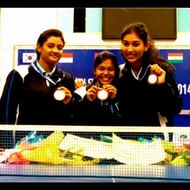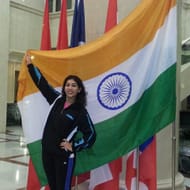A St. Stephen's College graduate, Neha Aggarwal was the only women’s table tennis player to represent India at the Beijing Olympics. She is also an avid blogger who loves to voice her opinions through social media.
Table tennis is one of the fastest sports at the Olympics. The kind of agility and speed that is required to excel in the sport is just beyond human imagination. And yet table tennis has never been able to achieve the popularity in India that it has long deserved. Being in a sport that has always been living on the peripherals of the nation's sporting culture, she still stands out as a voice for table tennis in India. After winning a National Games gold in Kerala this year, her year has kickstarted on an amazing note.
We caught up with the table tennis star and tried to figure out the present conditions of table tennis in our nation and where and why are we lacking?
Here are some excerpts:
How was the recent experience in Kerala (though we know from your blog how much you loved the tournament)?
The National Games were quiet special for me this time because I came back home with two medals (Gold in doubles and bronze in teams). Moreover, I was honored to be the flag bearer of Delhi contingent in the Opening Ceremony and I was the only TT player to be the flag bearer amongst all the participating states. Delhi as a team was brilliant and I loved the way we supported each other. Winning the Gold in doubles felt really special because Manika(my doubles partner) got injured before the finals and we still managed to win.
The hospitality and facilities at the venue were amazing. Initially, I was more than excited just to be a part of this extravaganza, because i love to play teams and doubles more than singles, and rest everything was like a cherry on the cake. It ended up being one of my most happy and memorable tournaments.
We saw a Twitter update by Mr. Shashi Tharoor who was more than elated to share a picture with a fellow Stephanian. Did he remind you of your days at St. Stephen's?
Meeting Shashi Tharoor was a great experience and we also shared a series of tweets during the entire tournament. He definitely reminded me of my days at St.Stephens, an institution which helped me grow not only as a student, but also as an individual. It always gave me space to pursue my game. Although I was not too regular at college due to my TT schedule, but I did enjoy my share of College time, the Cafe, hanging out with friends, The Harmony, the Sports Dinner, election time, and of course the class lectures.
India is a nation where parents still push their kids into academics because they think sports have no future. Did you ever face a similar situation? Do you have a message for parents to tell them the importance of encouragement and where it takes you.
Fortunately, I did not face such a situation in my career, despite coming from a non sporting background. I am blessed to have parents who supported me morally and financially at every point in my career. I owe all my achievements to them. In many cases, parents do not encourage their kids to pursue sport because of some myths like one cannot make a career in sports, studies get affected and many times parents get disappointed if the kid faces defeat or fails to live up to their expectations.
We need to have a positive outlook towards sports because even participation gives new experiences. Parents must encourage their kids to play whatever sport they love, because sport (at all levels) teaches us a lot of things- like discipline, hard work, time management and perseverance to name a few which only makes the child a better human being.
You have been in the Indian table tennis circuit for over a decade now. What are the major changes that you have witnessed in the game in the past couple of years?
The major achievements are that India now has a lot of names to talk about as far as our position in the world is considered. We have made considerable improvements with Sharath Kamal, A Amalraj, Soumyajit Ghosh, Manika Batra, K.Shamini creating ripples in the international arena. Winning medals in the last 3 editions of the Commonwealth Games(2006,2010,2014), the Indian team has a lot to offer. Also the juniors are doing great. Plus the federation is doing an amazing job with increased transparency at office work, conducting international tournaments in India, more international umpires, conducting (International Table Tennis Federation) ITTF coaching courses.
Moreover, a lot of PSUs have come forward offering employment and scholarships to meritorious players. One of the most recent achievements is, Archana Kamath, a 14 year old girl from Karnataka has been selected by the Olympic Gold Quest for her preparation for 2020 and 2024 Olympic Games. She is the first TT player to be selected by OGQ, Overall, the scenario is bright and we look forward to more.
The game has become really expensive now. A single sheet of rubber costs around Rs.4000 now. Is it possible for someone who does not belong to an effluent class to pursue the game? Don't you think the sport has become more 'elitist' now?
I do agree that the game has become expensive in recent years, and it gets difficult to pursue the game at the initial stages. However, the Table Tennis Federation of India (TTFI) does provide equipment at subsidized prices, STAG sponsors players even at State level and as mentioned earlier many PSUs are providing jobs, but these facilities are for the ones who have reached at atleast the State level. But we cannot deny the fact that more has to be done at this front. More funds have to be generated from both the government and Private sector.
Tennis works to a great extent because there is a certain 'glamour quotient' attached to it. Do you think table tennis is in dire need of leagues like HIL, IPTL, etc? A lot of sports in India have gained centre stage in the recent couple of years because of glamourization.
Yes, I totally defend the debate that TT has to be glamorized, I also wrote about it on my blog. The TTFI and the players need to market themselves and take the responsibility to promote the game. If a Table Tennis League can happen, it will do wonders for the sport. It is quiet ironical that you’ll find a TT table in every school, college, office or community center, but only a few would be able to name India’s top professional players. The media should also take interest in ‘other sports’ and not just cricket alone.
We often see that people who excel in academics eventually leave sports in India and vice versa. We have seen you excelling in both academics as well as sports. How did you manage both of them with such brilliance?
Time Management and hard work is the key. As a kid, I was taught not to waste a single second. My friends always mocked at my busy schedule and that I didn’t have a relaxed life, but somewhere I knew that it will pay later. Also, my parents supported me with this, making me understand the importance of both. I was also fortunate to have good teachers who helped me at all stages. Striking a balance at both studies and sport is difficult, but never impossible.
If someone wants to devote all his time to sports, do you think there are enough jobs in the government sector which can secure a sportsperson's future? If yes, do these jobs pay enough for his/her needs? Being a part of the Bharat Petroleum, do you think they have encouraged your sports and also help you gain financial stability as an individual?
Table Tennis is one of the few lucky sports where a lot of PSUs like Petroleum, Railways, Banks, Income Tax, Postal, CAG, etc provide employment. The jobs do give financial stability for an individual- they pay a decent salary, comparable to an engineering graduate. For me, the support from Bharat Petroleum has been tremendous and I feel that this association has been a catalyst in my professional career. They also provide kit and equipment, cash incentives and promotions for good performances. As a woman, TT has given me a career in which I am financially independent.
In India, almost all the funds that come from Sports Authority of India for development of sports, organizing of tournaments and national camps are passed on to the federations of various sports. Do you think these funds are utilized to the optimum level and help better the condition of your sport?
I am glad to see that in Table Tennis, the utilization of the funds has improved over the past 10 years. However, the budget allotted by the government for a game like TT is not enough to cover all the aspects related to the promotion of the game. Also, since there are no private sponsors, we have to rely on that limited budget. But to make better decisions on utilization of funds, I also strongly feel that the retired players and professionals should be included in the decision making processes so that every decision made is for the betterment of the players and the game.
Table tennis in India has not seen many players who made it to the top-100 of the world rankings apart from a very few like Achanta Sharath Kamal. Why do you think that has happened?
The problem lies at the grassroot level. Why only one out of a billion population? Nothing is being done at the grassroot level, the basics of the game need to be taught well. Players need to understand that one cannot become a champion over night, but yes, if the basic education is good, chances of succeeding are quiet high. I understood this after blogging; a lot of us still don’t know how to approach the sport to succeed at the international arena.
We lack the professionalism required. We are all talented and hard working, but unfortunately smart work beats hard work. Sharath Kamal has been able to do it because he is a rare combination of talent, hard work and intelligence. But he has earned all this over the years through a lot of struggle which not many are aware of. With a highest world rank of 39, Sharath Kamal is a legend and we must analyze his life to understand how he did it, and why others are not able to do it.
Also, Sharath Kamal has been training and playing leagues in Europe for the past couple of years and we haven't seen him play most of the National Rankings too. Doesn't India have enough facilities, given that we always a foreign coach training the paddlers in national camps?
Importing coaches is not the only solution because you also need good sparring partners to practice with. Moreover, in India we have only 7 domestic tournaments in a year as compared to Europe and China where a local player if playing in the league, competes almost every week, for 6-7 months.
Regular competition against better opponents improves the overall standard of the game. Plus the foreign coaches are appointed only for a fixed tenure, say maximum of 2 years which is really short, and changing coaches at this frequency only confuses the player. Sharath Kamal is currently playing for Germany’s top club Borrusia Dusseldorf, with Timo Boll (World No. 9) being his teammate. The kind of training and exposure he is getting there is incomparable to anywhere in the world, which also reflects in his game, he has been India’s top paddler for a consistent 12 years now winning medals at the CWG.
What according to you can improve the state of table tennis in India?
A lot of work has to be done at the grass root level. We have the talent, but we lack the education. Not only the players have to be taught the right technique, but the coaches also have to learn the correct methods of training which are suitable for the current scenario. The players and coaches together must adopt a professional approach towards training, and the goal should not be limited to only securing a job, but it should be to play and win medals at the highest level- the Olympics. We need more competition in India, 7 tournaments are quiet less for a player who is not in the Indian team or is not playing an international tournament.
We need to bring in the league system to boost competition. Also the tenure of the foreign coach should be at least one Olympic cycle i.e. 4 years and training should be at home and abroad too. TT has to be marketed well; we are not working on this aspect at all. Private companies should step in because the solution for all these problems is the funds which are unfortunately limited in the budget provided by the government. Above all, the perception towards sport needs to change. But overall, the kind of progress Table Tennis has made in the recent years is only a sign of a positive and great medal winning future.


